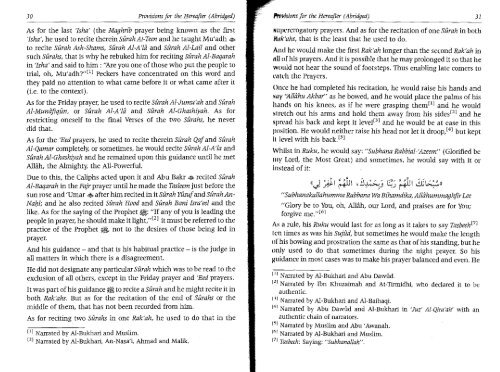Provisions for the Hereafter (Zaad Al-Ma'ad)
Provisions for the Hereafter (Zaad Al-Ma'ad)
Provisions for the Hereafter (Zaad Al-Ma'ad)
You also want an ePaper? Increase the reach of your titles
YUMPU automatically turns print PDFs into web optimized ePapers that Google loves.
30 <strong>Provisions</strong> <strong>for</strong> <strong>the</strong> <strong>Hereafter</strong> (Abridged)<br />
As <strong>for</strong> <strong>the</strong> last 'Isha' (<strong>the</strong> Maghrib prayer being known as <strong>the</strong> first<br />
'Isha', he used to recite <strong>the</strong>rein Sarah At-Teen and he taught Mu'adh<br />
to recite Sarah Ash-Shams, Sarah <strong>Al</strong>-Aid and Sarah <strong>Al</strong>-Lail and o<strong>the</strong>r<br />
such Sarahs, that is why he rebuked him <strong>for</strong> reciting Sarah <strong>Al</strong>-Bagarah<br />
in 'Isha' and said to him • 'Are you one of those who put <strong>the</strong> people to<br />
trial, oh, Mu'adh?" 313 Peckers have concentrated on this word and<br />
<strong>the</strong>y paid no attention to what came be<strong>for</strong>e it or what came after it<br />
(i.e. to <strong>the</strong> context).<br />
As <strong>for</strong> <strong>the</strong> Friday prayer, he used to recite Sarah <strong>Al</strong>-Jumu'ah and Sarah<br />
<strong>Al</strong>-Muncifician, or Sarah and Sarah <strong>Al</strong>-Ghashiyah. As <strong>for</strong><br />
restricting oneself to <strong>the</strong> final Verses of <strong>the</strong> two Sfirahs, he never<br />
did that.<br />
As <strong>for</strong> <strong>the</strong> 'Eed prayers, he used to recite <strong>the</strong>rein Sarah Qaf and Sarah<br />
<strong>Al</strong>-Qamar completely, or sometimes, he would recite Siirah <strong>Al</strong>-<strong>Al</strong>a and<br />
Sarah <strong>Al</strong>-Ghashiyah and he remained upon this guidance until he met<br />
<strong>Al</strong>lah, <strong>the</strong> <strong>Al</strong>mighty, <strong>the</strong> <strong>Al</strong>l-Powerful.<br />
Due to this, <strong>the</strong> Caliphs acted upon it and Abu Bakr 4 recited Sarah<br />
<strong>Al</strong>-Baciarah in <strong>the</strong> Fajr prayer until he made <strong>the</strong> Tasleem just be<strong>for</strong>e <strong>the</strong><br />
sun rose and 'Umar 4 after him recited in it Sarah Ya suf and Sarah An-<br />
Nahl; and he also recited Sarah Hood and Sarah Bani Isra'eel and <strong>the</strong><br />
like As <strong>for</strong> <strong>the</strong> saying of <strong>the</strong> Prophet *T: "If any of you is leading <strong>the</strong><br />
people in prayer, he should make it light, "E 23 it must be referred to <strong>the</strong><br />
practice of <strong>the</strong> Prophet *, not to <strong>the</strong> desires of those being led in<br />
prayer.<br />
And his guidance — and that is his habitual practice — is <strong>the</strong> judge in<br />
all matters in which <strong>the</strong>re is a disagreement.<br />
He did not designate any particular Sarah which was to be read to <strong>the</strong><br />
exclusion of all o<strong>the</strong>rs, except in <strong>the</strong> Friday prayer and 'Eed prayers.<br />
It was part of his guidance * to recite a Sarah and he might recite it in<br />
both Rak'ahs. But as <strong>for</strong> <strong>the</strong> recitation of <strong>the</strong> end of Sarahs or <strong>the</strong><br />
middle of <strong>the</strong>m, that has not been recorded from him<br />
As <strong>for</strong> reciting two Sfirahs in one Rak'ah, he used to do that in <strong>the</strong><br />
I Narrated by <strong>Al</strong>-Bukhari and Muslim.<br />
121 Narrated by <strong>Al</strong>-Bukhari, An-Nasa'i, Ahmad and Malik<br />
Pro visions <strong>for</strong> <strong>the</strong> <strong>Hereafter</strong> (Abridged) 31<br />
supererogatory prayers. And as <strong>for</strong> <strong>the</strong> recitation of one Sarah in both<br />
Itak 3ahs, that is <strong>the</strong> least that he used to do.<br />
And he would make <strong>the</strong> first Rak'ah longer than <strong>the</strong> second Rak'ah in<br />
all of his prayers. And it is possible that he may prolonged it so that he<br />
would not hear <strong>the</strong> sound of footsteps. Thus enabling late comers to<br />
catch <strong>the</strong> Prayers.<br />
Once he had completed his recitation, he would raise his hands and<br />
say 1/<strong>Al</strong>ldhu Akbar" as he bowed, and he would place <strong>the</strong> palms of his<br />
hands on his knees, as if he were grasping <strong>the</strong>mE ll and he would<br />
stretch out his arms and hold <strong>the</strong>m away from his sides [21 and he<br />
spread his back and kept it level 131 and he would be at ease in this<br />
position. He would nei<strong>the</strong>r raise his head nor let it droop,E 43 but kept<br />
It level with his back. 333<br />
Whilst in Ruku, he would say: "Subhana Rabbial-Azeem" (Glorified be<br />
my Lord, <strong>the</strong> Most Great) and sometimes, he would say with it or<br />
Instead of it:<br />
- „<br />
:r5thl<br />
"Subhanakallahumma Rabbana Wa Bihamdika, <strong>Al</strong>leihummaghfir Lee<br />
"Glory be to You, oh, <strong>Al</strong>lah, our Lord, and praises are <strong>for</strong> You;<br />
<strong>for</strong>give me." 161<br />
As a rule, his Ruku would last <strong>for</strong> as long as it takes to say Tasbeehm<br />
len times as was his Sujild, but sometimes he would make <strong>the</strong> length<br />
of his bowing and prostration <strong>the</strong> same as that of his standing, but he<br />
only used to do that sometimes during <strong>the</strong> night prayer. So his<br />
guidance in most cases was to make his prayer balanced and even. He<br />
111 Narrated by <strong>Al</strong>-Bukhari and Abu Dawfid.<br />
121 Narrated by Ibn Khuzaimah and At-Tirmidhi, who declared it to be<br />
au<strong>the</strong>ntic.<br />
1 ' 1 Narrated by <strong>Al</strong>-Bukhari and <strong>Al</strong>-Baihaqi.<br />
141 Narrated by Abu Dawfid and <strong>Al</strong>-Bukhari in 'Juz' <strong>Al</strong>-Qira'ah' with an<br />
au<strong>the</strong>ntic chain of narrators.<br />
Narrated by Muslim and Abu 'Awanah.<br />
I n I Narrated by <strong>Al</strong>-Bukhari and Muslim.<br />
111 Tasbeeh: Saying: "Subhanallah".

















